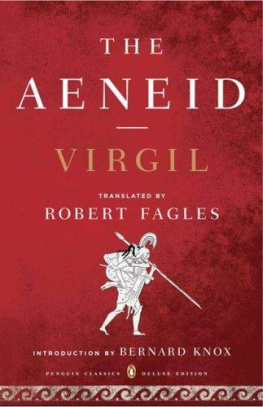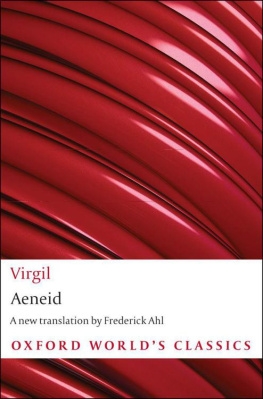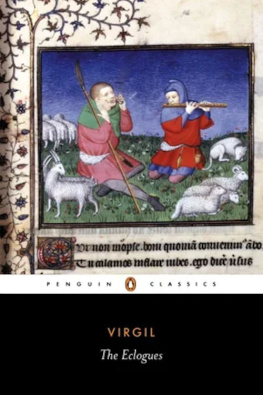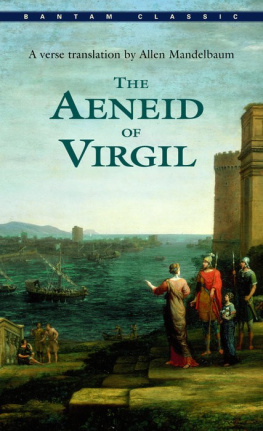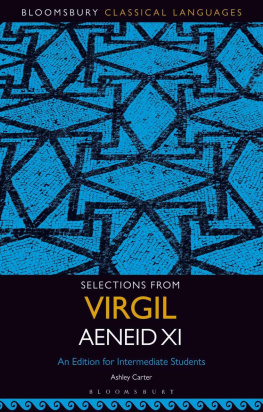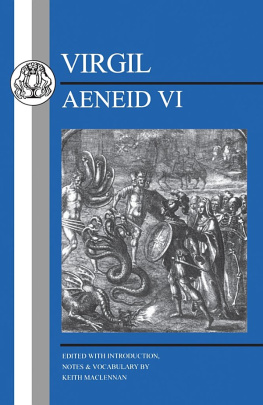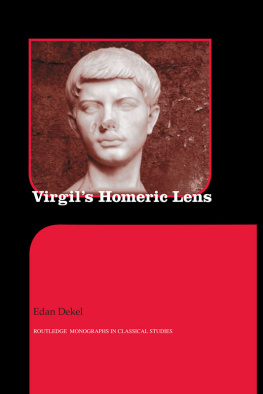Virgil - The Aeneid (Penguin Classics)
Here you can read online Virgil - The Aeneid (Penguin Classics) full text of the book (entire story) in english for free. Download pdf and epub, get meaning, cover and reviews about this ebook. year: 2003, publisher: Penguin Classics, genre: Art. Description of the work, (preface) as well as reviews are available. Best literature library LitArk.com created for fans of good reading and offers a wide selection of genres:
Romance novel
Science fiction
Adventure
Detective
Science
History
Home and family
Prose
Art
Politics
Computer
Non-fiction
Religion
Business
Children
Humor
Choose a favorite category and find really read worthwhile books. Enjoy immersion in the world of imagination, feel the emotions of the characters or learn something new for yourself, make an fascinating discovery.

The Aeneid (Penguin Classics): summary, description and annotation
We offer to read an annotation, description, summary or preface (depends on what the author of the book "The Aeneid (Penguin Classics)" wrote himself). If you haven't found the necessary information about the book — write in the comments, we will try to find it.
The Aeneid (Penguin Classics) — read online for free the complete book (whole text) full work
Below is the text of the book, divided by pages. System saving the place of the last page read, allows you to conveniently read the book "The Aeneid (Penguin Classics)" online for free, without having to search again every time where you left off. Put a bookmark, and you can go to the page where you finished reading at any time.
Font size:
Interval:
Bookmark:

THE AENEID
PUBLIUS VERGILIUS MARO was born in 70 BC near Mantua in the north of Italy, where his parents owned a farm. He had a good education and went to perfect it in Rome. There he came under the influence of Epicureanism and later joined an Epicurean colony on the Gulf of Naples where he was based for the rest of his life. In 42 BC he began to write the Eclogues, which he completed in 37 BC, the year in which he accompanied Horace to Brindisi. The Georgics were finished in 29 BC, and he devoted the rest of his life to the composition of the Aeneid. In his last year he started on a journey to Greece; meeting Augustus at Athens, he decided to travel back with him but he fell ill at Megara. He died in 19 BC on reaching Brindisi.
DAVID WEST is an Aberdonian, educated at the local grammar school and university and then at Sidney Sussex College, Cambridge. He has taught in the universities of Sheffield and Edinburgh and was Professor of Latin at Newcastle upon Tyne from 1969 to 1992. He notes that no such career would now be possible, since the departments of Classics at Aberdeen and Sheffield are now both defunct. His publications include Reading Horace (1967), The Imagery and Poetry of Lucretius (1969) and Horace: The Complete Odes and Epodes (1997). He has also produced editions with text, translation and commentary of the first three books of Horaces Odes (1995, 1998 and 2002). He is now working on a commentary on Shakespeares Sonnets.
VIRGIL
Translated and with an Introduction by
DAVID WEST
REVISED EDITION
PENGUIN BOOKS
PENGUIN BOOKS
Published by the Penguin Group
Penguin Books Ltd, 80 Strand, London WC2R 0RL, England
Penguin Putnam Inc., 375 Hudson Street, New York, New York 10014, USA
Penguin Books Australia Ltd, 250 Camberwell Road, Camberwell, Victoria 3124, Australia
Penguin Books Canada Ltd, 10 Alcorn Avenue, Toronto, Ontario, Canada M4v 3B2
Penguin Books India (P) Ltd, 11, Community Centre, Panchsheel Park, New Delhi 110 017, India
Penguin Books (NZ) Ltd, Cnr Rosedale and Airborne Roads, Albany, Auckland, New Zealand
Penguin Books (South Africa) (Pty) Ltd, 24 Sturdee Avenue, Rosebank 2196, South Africa
EISBN: 9780140449327
Penguin Books Ltd, Registered Offices: 80 Strand, London WC2R 0RL, England
www.penguin.com
First published 1990
Published in Penguin Classics 1991
Reissued with a revised Introduction and new Further Reading 2003
1
Translation and Introduction copyright David West, 1990, 2003
All rights reserved
The moral right of the translator has been asserted
Except in the United States of America, this book is sold subject
to the condition that it shall not, by way of trade or otherwise, be lent,
re-sold, hired out, or otherwise circulated without the publishers
prior consent in any form of binding or cover other than that in
which it is published and without a similar condition including this
condition being imposed on the subsequent purchaser
EISBN: 9780140449327
This translation is of course based on such of the vast scholarly literature as I have been able to read. Previous translations have been plundered. Standard commentaries have been consulted, notably R. G. Austin on Books 1, 2, 4 and 6; R. D. Williams on 3 and 5; C. J. Fordyce on 7 and 8. Particularly valuable have been E. Norden on 6, P. T. Eden on 8 and Stephen Harrison on 10. The Aeneidea of James Henry have been an inspiration.
Rosemary Burton and E. L. Harrison criticized the whole translation. Stephen Harrison, James Morwood and Nicholas Horsfall commented on whole books or extended passages. Pamela West, Janet Watson and Jane Curran were shrewd and generous consultants. To all of these I owe a debt that cannot be paid, as I do to my wonderful colleagues in the best of all imaginable university departments of Classics.
To the great dead who will not die
The Aeneid is the story of a man who lived three thousand years ago in the city of Troy in the north-west tip of Asia Minor. What has that to do with us?
Troy was besieged and sacked by the Greeks. After a series of disasters Aeneas met and loved a woman, Dido, queen of Carthage, but obeyed the call of duty to his people and his gods and left her to her death. Then, after long years of wandering, he reached Italy, fought a bitter war against the peoples of Latium and in the end formed an alliance with them which enabled him to found his city of Lavinium. From these beginnings, 333 years later, in 753 BC, the city of Rome was to be founded. The Romans had arrived in Italy.
The Aeneid is still read and still resonates because it is a great poem. Part of its relevance to us is that it is the story of a human being who knew defeat and dispossession, love and the loss of love, whose life was ruled by his sense of duty to his gods, his people and his family, particularly to his beloved son Ascanius. But it was a hard duty and he sometimes wearied of it. He knew about war and hated the waste and ugliness of it, but fought, when he had to fight, with hatred and passion. After three millennia, the world is still full of such people. While we are of them and feel for them we shall find something in the Aeneid. The gods have changed, but for human beings there is not much difference:
Pitiless Mars was now dealing grief and death to both sides with impartial hand. Victors and vanquished killed and were killed and neither side thought of flight. In the halls of Jupiter the gods pitied the futile anger of the two armies and grieved that men had so much suffering
10.7559
But the Aeneid is not simply a contemplation of the general human predicament. It is also full of individual human beings behaving as human beings still do. Take the charm and humour of Dido putting the Trojans at their ease at 1.56278; the grief of Andromache when she meets the Trojan youth who is the same age as her son Astyanax would have been if he had been allowed to live we do not need to be told that Astyanax is the name on the second altar at 3.305; the cunning of Acestes and Aeneas as they shame the great old champion back into the ring at 5.389408; the childish joke of Iulus at 7.116 and its momentous interpretation; the aged hero feasting his eyes on his old friends son at 8.152 or realizing at 8.560 that he can do nothing now except talk; the natives abuse of the foreigners from 9.598; the lying harridans at the beginning of Book 10 or the death of Mezentius and his horse from 10.858; the growling of Aeneas and the fussing and fumbling of the doctor as he plies his mute, inglorious art from 12.387.
The Aeneid presents a heroic view of the life of man in all its splendour and anguish, but it is also full of just observation of the details of individual behaviour. It is not yet out of date.
Virgil was born seventy years before Christ. In 44 BC, after a century of civil war and disorder, Julius Caesar was assassinated by Brutus and Cassius in the name of liberty. His heir was his nineteen-year-old grand-nephew and adopted son, Octavian, astute, ruthless and determined. In 42 BC at Philippi Brutus and Cassius were defeated and the fortunes of Virgil were at their lowest ebb. His family estates at Mantua were confiscated by the victors to provide land for their soldiers to settle on. But he won the patronage of Maecenas, one of the two chief aides of Octavian, and published his pastoral
Next pageFont size:
Interval:
Bookmark:
Similar books «The Aeneid (Penguin Classics)»
Look at similar books to The Aeneid (Penguin Classics). We have selected literature similar in name and meaning in the hope of providing readers with more options to find new, interesting, not yet read works.
Discussion, reviews of the book The Aeneid (Penguin Classics) and just readers' own opinions. Leave your comments, write what you think about the work, its meaning or the main characters. Specify what exactly you liked and what you didn't like, and why you think so.

